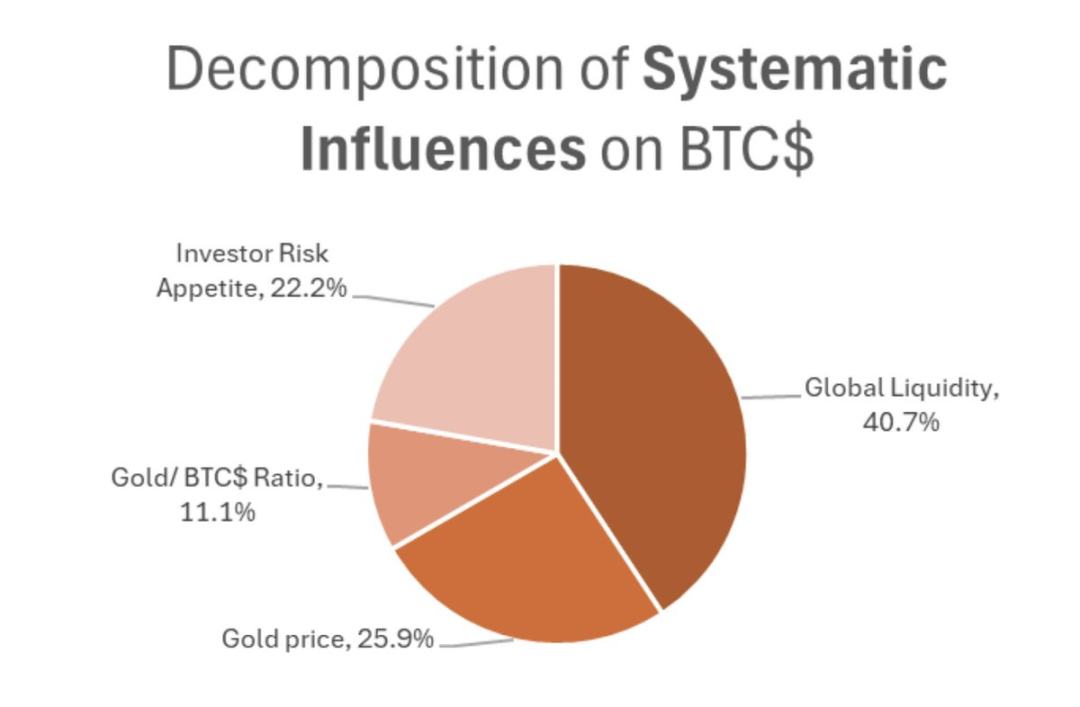Written by: fejau
Translated by: Luffy, Foresight News
I want to write down some thoughts I have been repeatedly contemplating, which is how Bitcoin might perform when experiencing an unprecedented major capital flow transformation since its inception. I believe that once the deleveraging process ends, Bitcoin will encounter an excellent trading opportunity. In this article, I will elaborate on my thoughts in detail.
What are the key driving factors of Bitcoin prices?
I will draw upon Michael Howell's research on the historical driving factors of Bitcoin price trends, and then use these findings to further understand how intertwined factors might evolve in the near future.

As shown in the image above, Bitcoin prices are driven by these factors:
Investors' overall preference for high-risk, high-beta assets
Bitcoin's correlation with gold
Global liquidity
Returning to the title of this article, the first round of trading involves selling overweighted U.S. dollar assets globally and avoiding the ongoing deleveraging process. As global allocation of these assets is severely overweight, the deleveraging process could become chaotic when large fund managers and more speculative participants like multi-strategy hedge funds with strict stop-loss settings reach their risk limits. When this occurs, it will result in days similar to margin call notices, where large amounts of assets need to be sold to raise cash. Currently, the key is to survive this process and maintain sufficient cash reserves.
However, as the deleveraging process stabilizes, the next round of trading begins. This involves diversifying the portfolio to include foreign stocks, foreign bonds, gold, commodities, and even Bitcoin.
We have already begun to see this dynamic gradually form during market rotations and days without margin call notices. The U.S. Dollar Index (DXY) is falling, U.S. stock markets are underperforming compared to stock markets in other parts of the world, gold prices are soaring, and Bitcoin is surprisingly resilient relative to traditional U.S. tech stocks.
I believe that as this occurs, the marginal growth of global liquidity will shift to a state completely opposite to what we have been accustomed to. Other parts of the world will take the lead in increasing global liquidity and risk appetite.
When I consider the risks of such diversification in the context of global trade wars, I am concerned that deeply investing in risk assets of other countries might bring tail risks, as negative headlines about tariffs could emerge and impact these assets. Therefore, during this transition, gold and Bitcoin become my preferred choices for global diversification.
Gold is currently performing extremely strongly, setting new historical highs daily. However, despite Bitcoin's surprisingly resilient performance throughout this transformation, its beta correlation with risk appetite has so far limited its gains, failing to match gold's exceptional performance.
So, as we move towards global capital rebalancing, I believe the next trading opportunity after this round lies with Bitcoin.
When I compare this framework with Howell's correlation research, I find they are mutually compatible:
U.S. stock markets will not be influenced by global liquidity, only by liquidity measured through fiscal stimulus and some capital inflows. However, Bitcoin is a global asset that reflects the broader state of global liquidity.
As this perspective gradually gains recognition, and risk allocators continue rebalancing, I believe risk appetite will be driven by other parts of the world, not the United States.
Gold's performance could not be better, and Bitcoin's partial correlation with gold aligns with our expectations.
Considering all these factors, for the first time in my life, I see the possibility of Bitcoin decoupling from U.S. tech stocks. I know this is a high-risk idea and often signals a local high point for Bitcoin's price. However, this time, the capital flow might undergo significant and lasting changes.
So, for a risk-seeking macro trader like myself, Bitcoin feels like the most worthwhile trade after this round. You cannot impose tariffs on Bitcoin, it doesn't care which country's borders it's within, it provides high-beta returns for the portfolio, and it lacks tail risks associated with U.S. tech stocks. I don't need to judge whether the EU can solve its own problems, and it offers exposure to global liquidity, not just U.S. liquidity.
This market landscape is precisely Bitcoin's opportunity. Once the dust of deleveraging settles, it will be the first to start and accelerate forward.







